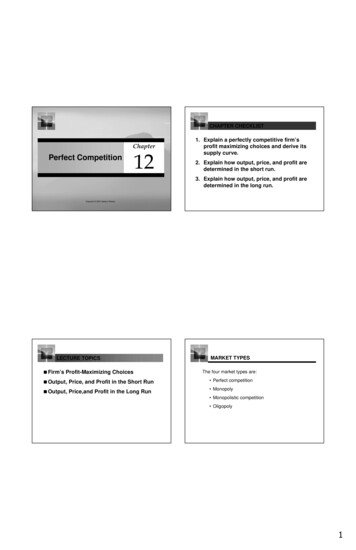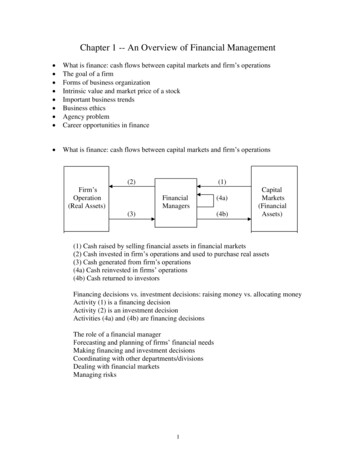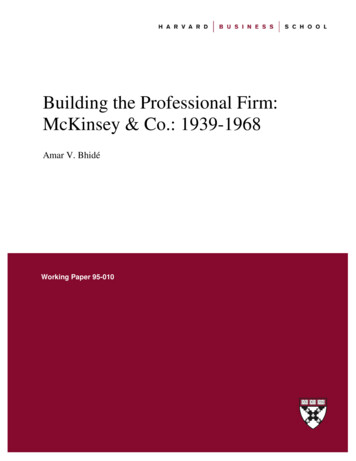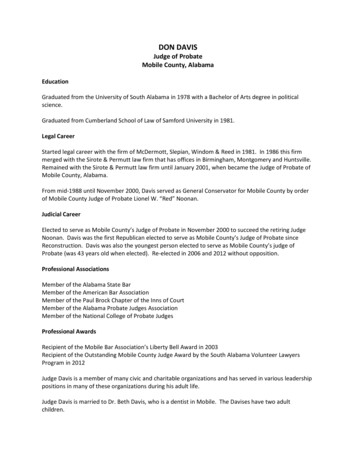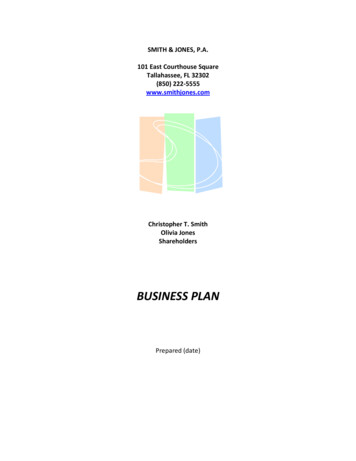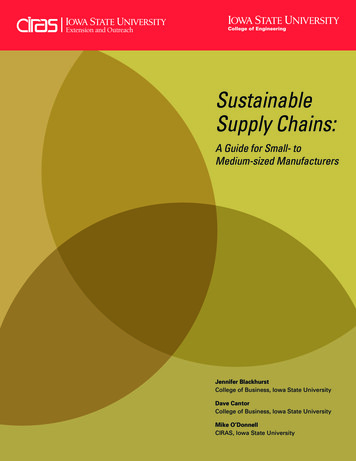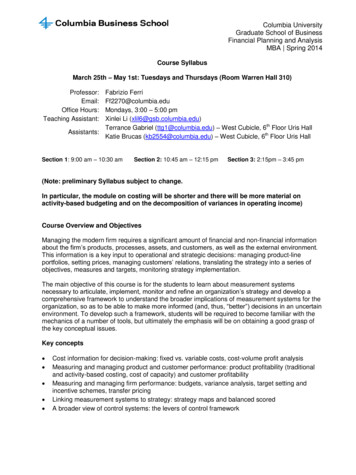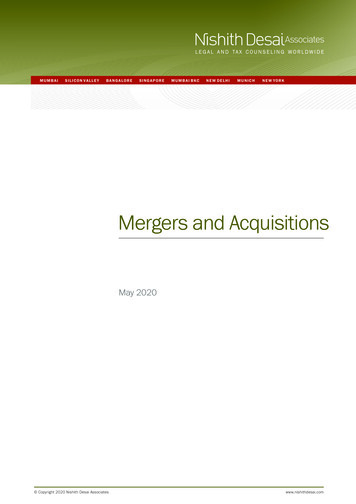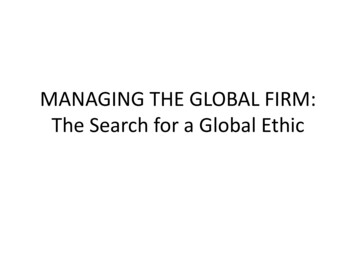
Transcription
MANAGING THE GLOBAL FIRM:The Search for a Global Ethic
The Question By what values do global firms operate? Is there a single definition of humanvalues – or many? Is there a core of values that allsocieties and religions hold? Are there some behaviors that areuniversally held to be unethical?
Why is this important? We live in closer proximity to each other in aglobal world and our value differences cannot beignored Global migration makes every country andcompany a mix of ethnicities, religions, andvalues Ethical or value disagreements are at the core ofmany (most?) conflicts between nations Solutions to more social and environmentalproblems require global cooperation and sharedvalues
SIX WAYS WE TRADITIONALLY DEFINEWHAT IS ETHICAL IN THE WEST1. Analyze whether the proposed behavior orstandard of behavior promotes the GREATESTGOOD or the greatest human welfare2. Identify the legitimate RIGHTS or HUMANRIGHTS of individuals or groups affected, andthe DUTIES of the actors3. Analyze whether all parties are treated FAIRLY -that is equally or differently only if there is alegitimate reason to do so
SIX WAYS WE TRADITIONALLY DEFINEWHAT IS ETHICAL IN THE WEST4.5.6.Ask whether the COMMON GOOD isadequately servedAnalyze whether the proposed behavior isconsistent with recognized VIRTUESAsk whether the parties are in rightRELATIONSHIP to each other
THE REALITY These six do not define a workable set ofethical standards Still have to define “good,” “legitimate rights,”“fairness,” “common good,” etc.
Other approaches to ethics Buddhism– ethics is based on the enlightened perspective of the Buddha;– five negative precepts: killing, lying, stealing, sexual misconduct,intoxicants– Four positive attitudes: loving-kindness, compassion, sympathetic joy,equanimity Christianity––––Ethics is living in harmony with God and natureLove God and love your neighbor as yourselfRecognize and atone for sin which separates from GodBible as source: 10 Commandments; teachings of Jesus
Other approaches to ethics Confucian Ethics–––––Relationships are key grounding of ethicsThe closer the relationship, the more you oweFilial piety most important virtueThe ideal ruler leads by exampleLater Confucians add more universalist perspective Greek Ethics––––––Philosophy bloomed in 5th and 4th century BCUsually concerned with the good life – eudaimonia or happinessInterest in motive and characterInterest in the good Citizen, the role and control of self-interestSocrates, Plato and Aristotle key figuresStrong emphasis on senses, reasoning and argument, not the gods
Other approaches to ethics Hindu Ethics––––Virtue of reciprocity because we may be reincarnatedConcern for others because soul is shared by allKindness, hospitality, empathy key virtuesImportance of spiritual practices, often drawn from gurus Humanist/Secularist Ethics– As known by human faculties and scientific reason– Many systems exist but most emphasize natural rights and socialcontracts– Natural or intuitionist, or more recently biological knowledge of ethicskey to some systems
Other approaches to ethics Islamic Ethics–––––Key obligation is to submit to God’s willKey challenge is determining God’s willMost important virtues: piety and humilitySeparation from materialism and honors of this worldTeaching embodied in the Qur’an Jewish Ethics– Originates in Hebrew Bible– As elaborated by legal injunctions, wisdom narratives and propheticteachings; extensive rabbinic writings– Much written as proverbs rather than higher philosophical principles andideals– Rabbinic literature has three, six, seen, ten and thirty laws of ethics
Hans Kung’s Principles of Global Ethics1.2.3.4.Every human being must be treated humanelyTreat others as you would like to be treatedHave respect for life (no violence)Deal honestly and fairly (no cheating,favoritism)5. Respect and love one another (cherish and love)
Attempts at a Global Ethic 1948 United Nations Universal Declaration ofHuman Rights UN Related Agencies (e.g. International LaborOrganization) UN Conventions and Resolutions (e.g. Law of theSea 1982) 1993 Parliament of World Religions 1997 Universal Declaration of HumanResponsibilities Millenium Development Goals 2004-2015
United NationsUniversal Declaration on Human RightsPREAMBLE Whereas recognition of theinherent dignity and of theequal and inalienable rightsof all members of thehuman family is thefoundation of freedom,justice and peace in theworld,
Parliament of World Religions1893/1993
1993 Parliament “Toward a Global Ethic”Drawing on many of the world's religious and spiritual traditions,the declaration identifies the Golden Rule: What you wish doneto yourself, do to others! as "unconditional norm for all areas oflife" and four essential affirmations as shared principles essentialto a global ethic:1. Commitment to a culture of non-violence and respect for life2. Commitment to a culture of solidarity and a just economicorder3. Commitment to a culture of tolerance and a life oftruthfulness4. Commitment to a culture of equal rights and partnershipbetween men and women
Universal Declaration of HumanResponsibilities (Not Adopted) “IT’S TIME TO TALK ABOUT GLOBALRESPONSIBILITIES: Globalization ofthe world economy is matched byglobal problems, and global problemsdemand global solutions on the basisof ideas, values and norms respectedby all cultures and societies.Recognition of the equal andinalienable rights of all the peoplerequires a foundation of freedom,justice and peace - but this alsodemands that rights andresponsibilities be given equalimportance to establish an ethicalbase so that all men and women canlive peacefully together and fulfiltheir potential. A better social orderboth nationally and internationallycannot be achieved by laws,prescriptions and conventions alone,but needs a global ethic.” INTERACTION COUNCIL
UN Millenium Development Goals2004-20151.2.3.4.5.6.7.8.To eradicate extreme poverty and hungerTo achieve universal primary educationTo promote gender equalityTo reduce child mortalityTo improve maternal healthTo combat HIV/AIDS, malaria, and other diseasesTo ensure environmental sustainabilityTo develop a global partnership for development
How does a global ethic spread? From the top down by adoption by the world’snation states and international organizations? From the ground up by adopting it in as manyreligions, institutions, and individual lives aspossible? With leadership from business coporations?
International Standards Movementin Business Origins– Sullivan Principles (1977)– Corporate Standards and Principles of all kinds Levi Strauss Terms of Engagement (1991) OECD Guidelines for Multinationals (1976)– Electronic Industry Code of Conduct (“CitizenCoalition”) (2004)– International Standards Organization (1946) ISO 14000 – Environmental Management (2004) ISO 26000 – Corporate Social Responsibility (2010) UN Global Compact (2000) Ruggie Principles on Business and Human Rights (2011) Many - by industry and by type of behavior
United Nations Global CompactHuman Rights Principle 1: Businesses should support and respect the protection ofinternationally proclaimed human rights; and Principle 2: make sure that they are not complicit in human rights abuses.Labour Principle 3: Businesses should uphold the freedom of association and the effectiverecognition of the right to collective bargaining; Principle 4: the elimination of all forms of forced and compulsory labour; Principle 5: the effective abolition of child labour; and Principle 6: the elimination of discrimination in respect of employment andoccupation.Environment Principle 7: Businesses should support a precautionary approach to environmentalchallenges; Principle 8: undertake initiatives to promote greater environmental responsibility;and Principle 9: encourage the development and diffusion of environmentally friendlytechnologies.Anti-Corruption Principle 10: Businesses should work against corruption in all its forms, includingextortion and bribery.
Many Remaining Questions1. What are the universal ethical standards?2. Which standards are “ethical” and which are“cultural?”3. Who decides which are global ethicalstandards?4. Many terms need defining – freedom,welfare, the common good, etc.5. Who is bound by a global ethic – individuals,organizations, nation states, internationalorganizations?
Remaining Questions, Continued6. How do global ethics get disseminated?7. What is the role of governments, businessesand voluntary organizations in their spread?8. What role do religions play? Facilitator orbarrier?9. How does unethical behavior get addressed?
MANAGING THE GLOBAL FIRM: The Search for a Global Ethic . The Question . Other approaches to ethics Buddhism –ethics is based on the enlightened perspective of the Buddha; . Ruggie Principles on

